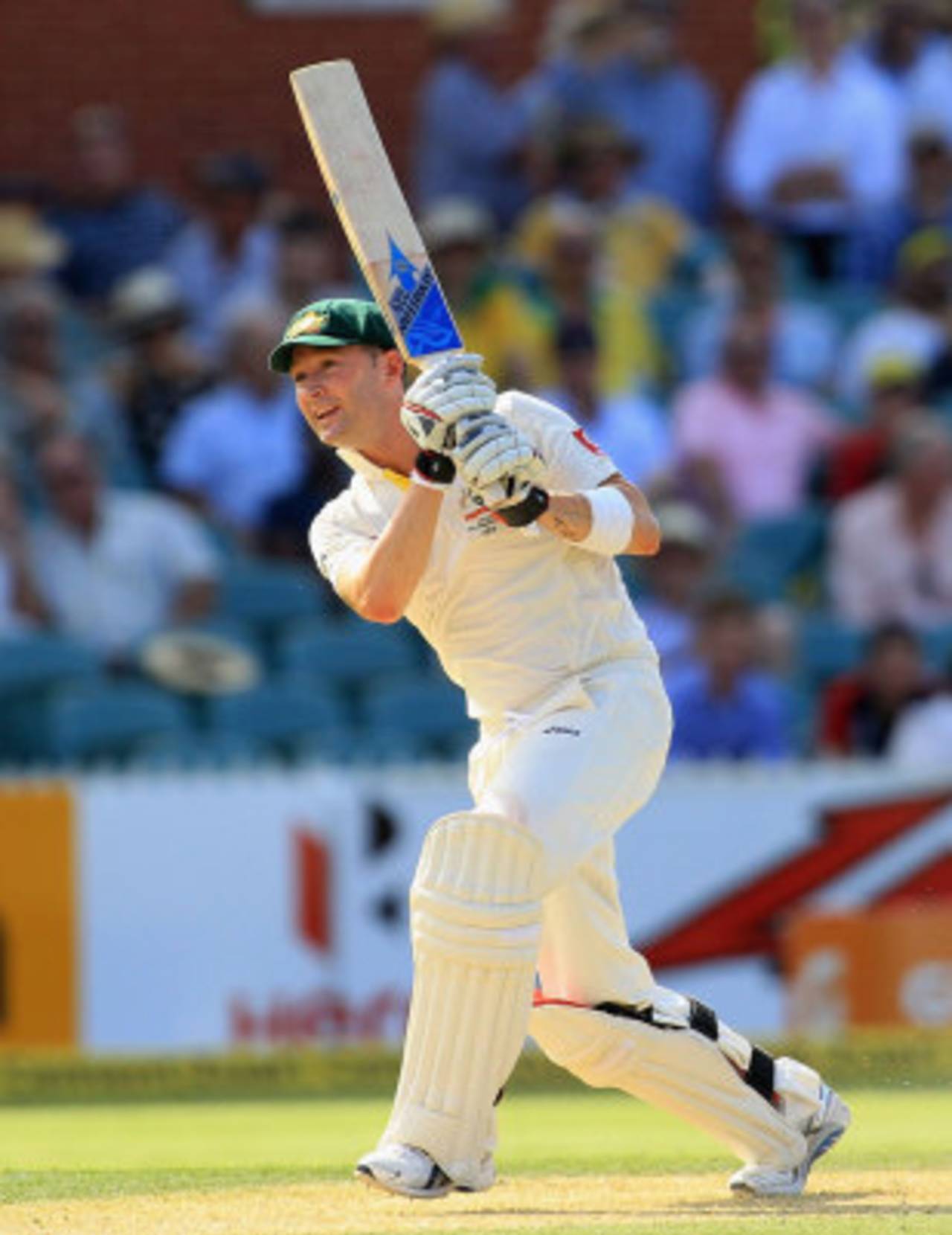Clarke's medal to lose
Australia's captain Michael Clarke is widely expected to win his third Border Medal on Monday
Daniel Brettig
Feb 26, 2012, 9:54 AM

Michael Clarke's successful year is likely to be capped by the Allan Border Medal • Getty Images
Previous winners of the Allan Border Medal
2000: Glenn McGrath
2001: Steve Waugh
2002: Matthew Hayden
2003: Adam Gilchrist
2004: Ricky Ponting
2005: Michael Clarke
2006: Ricky Ponting
2007: Ricky Ponting
2008: Brett Lee
2009: Ricky Ponting and Michael Clarke
2010: Shane Watson
2011: Shane Watson
One of many pungent passages of the Australian team performance review, helmed by Don Argus, was critical of the fact Australia's cricketers have been ranked and paid based on their performances relative to each other, rather than relative to the team's global standing. The question of how best to pay the members of the national team is presently being wrestled over by Cricket Australia and the Australian Cricketers' Association.
A similar conundrum may be attached to the Allan Border Medal, CA's stab at staging a glitzy, red carpet awards night to usher the international summer to a close. The previous two editions of the medal were scooped by Shane Watson, though his performances in each summer were better termed useful than overwhelming. Particularly last summer, when the Ashes had been lost in such catastrophic fashion, Watson's award seemed to bestow upon him little more than "best of a bad bunch" status.
Not so this year. Australia's captain Michael Clarke is widely expected to win his third Border Medal at Melbourne's Crown Casino, and if so it will be an award well earned. Clarke's performances for his country, both with the bat and as an aggressive, inventive and brave captain, have been the best of his career, shepherding the team through a period of much uncertainty and structural change into a position where a return to the top of the world rankings does not look as fanciful as it did a year ago.
Clarke's numbers over the voting period are compelling. In the longest form, 1167 runs at an average of 68.64, and there was a quartet of innings that arguably bettered anything he had managed in the years before he became captain. First he made a century in Colombo to seal a 1-0 series victory in his first Test assignment as captain, then he braved all the hosts could hurl his way in a coruscating 151 on a treacherous Cape Town surface in South Africa. There was the monumental 329 not out against India at the SCG, and then another double century in Adelaide to follow it up. All these runs were made with skill, grace and no little speed, the maturation of a batsman who had hinted at greatness on debut against India in Bangalore in 2004.
Plenty of ODI runs accrued also, and it should be noted that his only limited-overs century of the voting period took place against Bangladesh in Dhaka in Clarke's first match as the fully-fledged Australian captain. Otherwise he contributed consistently and cleverly, batting around the bigger hitters both above and below him in the order, while also fielding and leading with a level of imagination arguably not seen from an Australian captain since Mark Taylor retired in 1999.
Other contenders for the Test player of the year include Michael Hussey, who produced the series of his life in Sri Lanka to earn Man-of-the-Match honours in all three Tests. Another candidate is Peter Siddle, who plucked 40 wickets from nine consecutive Tests over the voting period as he was remodelled by Clarke and Craig McDermott from good, ordinary carthorse he seemed typecast as under Ricky Ponting to a latter-day Merv Hughes always willing and able to bowl that wicket-taking spell when most required.
The ODI category intrigues for the fact that aside from Clarke, two of the best players across 2011 have been all but invisible across the home summer. Shane Watson led the ODI batting aggregates, a brutal 185 not out against Bangladesh in Dhaka setting an Australian record for six-hitting, and Mitchell Johnson racked up 36 ODI wickets, including one startling burst of 6-31 against Sri Lanka in Pallekele. At a time when the national team appeared to have moved on from the aforementioned pair, the Border medal night may provide a reminder of their worth.
Other categories include Australia's domestic player of the year. By making a century in the Sheffield Shield final at the end of last summer then earning his way into the Test team with a string of domestic centuries in November and December, the Tasmanian opening batsman Ed Cowan will have strong claims to claim the award. Rob Quiney and James Faulkner will also have their backers. The Bradman young cricketer of the year award appears destined for the mantelpiece of James Pattinson, as the best performed of a battery of young Australian fast bowlers that also includes Pat Cummins and Nathan Coulter-Nile.
After a period in which the Border medal's value declined in direct proportion to the performances that it recognised, Australian cricket's night of glamour is again an occasion of worth. It will be an enormous surprise to all if Clarke does not walk away with it at night's end.
Edited by Siddarth Ravindran
Daniel Brettig is an assistant editor at ESPNcricinfo. He tweets here